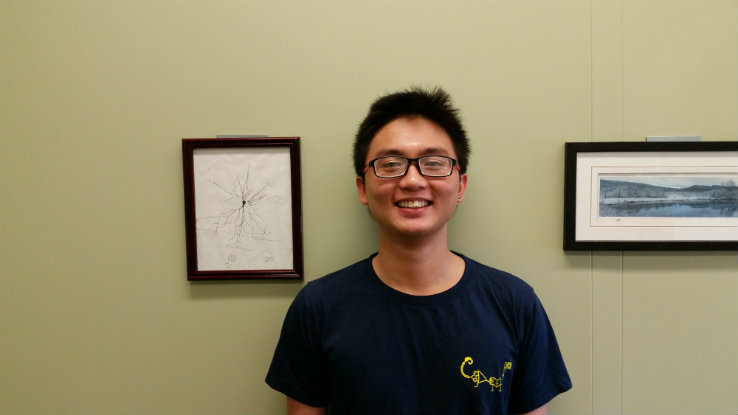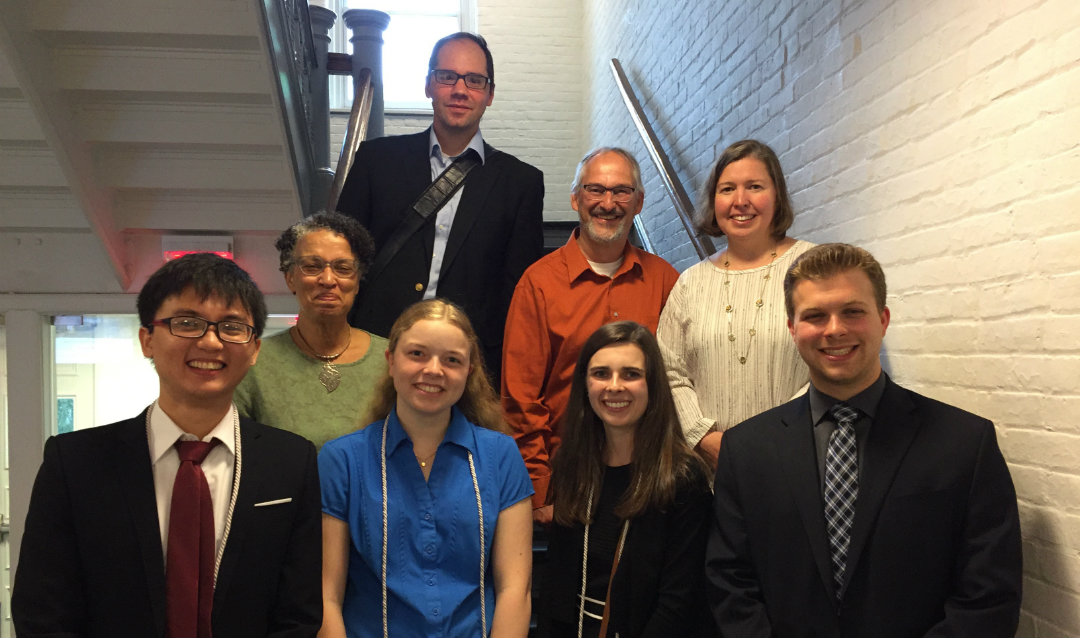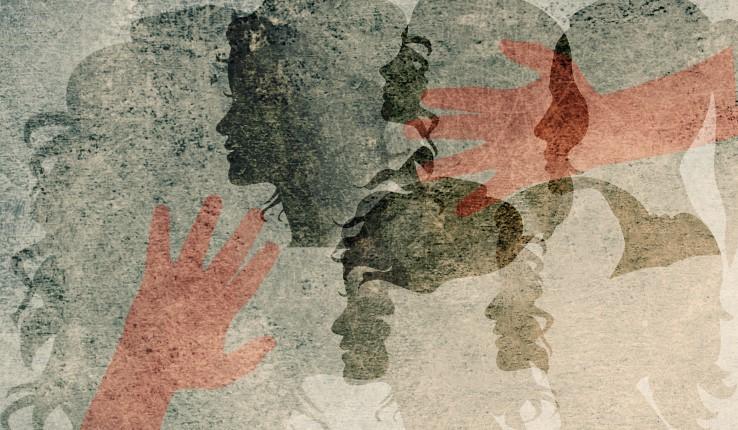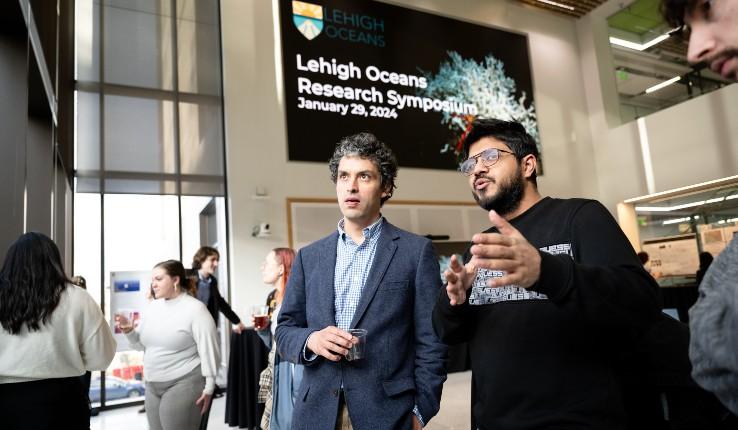When Tuan Pham ’18 arrived at Lehigh, he thought he might study psychology. But then he studied a chapter about neurons and the biological roots of psychology, and he was hooked. Recognizing his desire to study computational neuroscience before he knew what the term meant, he says, he found his place in the lab of Julie Haas, associate professor of neuroscience in the Department of Biological Sciences. He continued his work there through the summer after he graduated from Lehigh with a degree in behavioral neuroscience and minors in computer science and electrical engineering.
Lehigh Graduate Wins Prestigious International Award for Undergraduate Research
Tuan Pham ’18 has been awarded the Brains for Brains Young Researcher Award from the Bernstein Network Computational Neuroscience for his undergraduate work in the lab of Dr. Julie Haas.

Tuan Pham '18
Now a doctoral student in computational neuroscience at the University of Chicago, Pham has been recognized by the Bernstein Network Computational Neuroscience, one of the top international organizations for computational neuroscience, for research he conducted as an undergraduate.
The Brains for Brains Young Researcher Award, which is presented on a biennial basis, “recognizes the special achievements of young scientists who have shown their outstanding potential already at a very early career stage—even before starting their doctoral studies.” Awardees receive a grant for a one-week trip to Germany for the award ceremony during the international Bernstein Conference in Berlin and visits to up to two German research institutions in computational neuroscience. Pham is the ninth recipient of the award.
“The award is an elite marker of promise for young researchers, and the competition is international and quite strong,” says Haas, who recommended Pham for the award.
‘An Unending Appetite for New Information’
The human brain takes in information from the senses about its surroundings—spatial, visual, audio—and tries to make sense of it. That information comes all at once. Haas and her team seek to understand how that information is relayed to the cortex, where it’s bound into thoughts. They study the electrical synapses that connect specific sets of neurons in the brain and “whether those synapses themselves have the ability to change as a function of what you do,” explains Haas. “We study the rules whereby neurons change their connection strengths. We ask, ‘how do the electrical synapses that are embedded within that circuit change how that circuit works, and in turn change how it relays information to the rest of your brain?’”
The team also conducts parallel computational work that mimics neuronal circuits to determine how their activity depends on the strengths and types of connection that are embedded in those circuits. Pham focused on this aspect of the work in particular: He made equation-based models of how a neuron behaves and how they communicate with each other.
Together, Pham and Haas have published papers in highly regarded journals: one in Scientific Reports and the other in PLoS Computational Biology, both of which list Pham as first author. The first focuses on exploring a local circuitry involving a specific brain area that controls attention to the sensory environment. The second, says Haas, “addresses the issue in a more general manner, in a canonical circuit that is embedded throughout the brain.” A forthcoming third paper, written in collaboration with Maria Geffen at the University of Pennsylvania, will appear in the journal Cell Reports and explores the fear center of the brain and how it can help highlight salient sensory input.
The Haas Lab 2018: Julie Haas, associate professor of neuroscience; Tuan Pham '18; Brandon Fricker '19 and research scientist Huai-xing Wang.
The award is an elite marker of promise for young researchers, and the competition is international and quite strong.
“Tuan was always so inquisitive and interested in whatever he could learn,” says Haas. “He took many courses, hard courses that weren’t in his course requirements, just because he was interested in that topic. He has an unending appetite for new information.”
As an Eckardt Scholar at Lehigh, Pham was able to satisfy that appetite and select courses based on his interests, with the help and encouragement of both Haas and his academic advisor, Jennifer Swann, professor of behavioral neuroscience. The Eckardt Scholars Program, a selective and unique honors program in the College of Arts and Sciences, emphasizes interdisciplinary exploration, allowing him to tailor his coursework to what he wanted to learn for his work in the lab.
“The Eckardt Scholars Program really did give me not only the freedom but also the push for me to explore different things,” says Pham. “I really believe that when I take a course with intent, I internalize it more easily... It turned out, at least up to [now] in grad school, those classes, the materials I learned are still somewhere in my mind. I know how to look them up, I know how to get there because I was just able to do what I like. I really am glad that I took advantage of that.”
Working in Haas’ lab also provided plentiful opportunities for independent discovery.
“[In the lab,] I was really exploring different things, how to do different things, different ways of how to do things,” Pham says. “[Some] ways I learned from [Haas], some ways I developed on my own, some ways I learned from others…[Haas] allowed me to develop, with some guidance, of course, for how to do those things on my own…That’s the kind of mentor she is. She just lets you explore.”
Pham looks forward to learning even more in Germany in September.
“I will be developing my thesis proposal in the next year, hopefully,” he says. “The opportunity to meet other people [at the conference] as well as hear what other people say about different methods, about different types of research, will be very helpful to me in how to develop that thesis: what to consider, what not to consider, what are the interesting things right now, what is known and not known, what is being debated, what's controversial, what has some consensus. ...I’ll be able to have personal interaction with [researchers]...[and] have conversations with the people who have more experience than me as well as have some opinions…Being established researchers, they will give me the answers, or at least will help me to clarify my own questions.”
For Haas, witnessing Pham’s accomplishments has been gratifying.
“Witnessing what a student achieves, knowing that I mentored and developed someone to that point, is a different stage in my career.” says Haas. “Tuan’s papers aren’t my direct work, but rather my work in him… and those connections stay present for the rest of our lives.”
The Haas lab is funded by the Brain and Behavior Foundation, the Whitehall Foundation and the National Science Foundation.

Eckardt Scholars students and faculty (clockwise from top): Marcos Pires, associate professor of chemistry; Matthias Falk, professor of cell biology; Julie Haas, associate professor of neuroscience; Garrett Santini '18; Julia Nelson '18; Rachel Margraf '18; Tuan Pham '18; and Jennifer Swann, professor of behavioral neuroscience.




